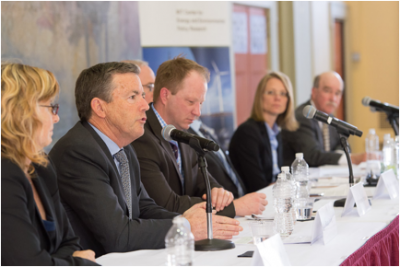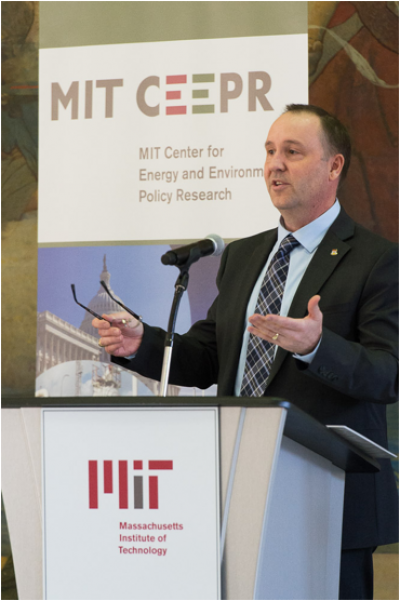 “Sound climate policy makes for good politics.” In a nutshell, that was the message conveyed by a high-ranking delegation of government, civil society and business representatives from British Columbia, who discussed experiences with their province’s carbon tax at an Earth Day Colloquium organized on April 13, 2015 by the MIT Energy Initiative (MITEI) and the MIT Center for Energy and Environmental Policy (CEEPR). More than 200 participants convened in the Walker Memorial’s spacious Morss Hall to hear first-hand how British Columbia was able to introduce a carbon price, and what effects it has had on the local economy and the environment. Comments by MIT faculty and a local State Senator underscored the economic merits of carbon pricing and its prospects as a policy option for Massachusetts.
“Sound climate policy makes for good politics.” In a nutshell, that was the message conveyed by a high-ranking delegation of government, civil society and business representatives from British Columbia, who discussed experiences with their province’s carbon tax at an Earth Day Colloquium organized on April 13, 2015 by the MIT Energy Initiative (MITEI) and the MIT Center for Energy and Environmental Policy (CEEPR). More than 200 participants convened in the Walker Memorial’s spacious Morss Hall to hear first-hand how British Columbia was able to introduce a carbon price, and what effects it has had on the local economy and the environment. Comments by MIT faculty and a local State Senator underscored the economic merits of carbon pricing and its prospects as a policy option for Massachusetts.
 MIT Chancellor Cynthia Barnhart opened the event with a brief welcome address, handing over to Parliamentary Secretary for Energy Literacy and the Environment of British Columbia, Mike Bernier. In his keynote address, Bernier described the history, design and early impacts of his province’s carbon tax, which he praised for shifting costs from desirable to undesirable activities, namely from employment and investment to pollution. Because the tax is revenue-neutral, he explained, it has helped limit carbon emissions and fuel use while reducing individual and corporate income taxes, effectively boosting the British Columbian economy. “What we’ve been doing in British Columbia has not gone unnoticed”, Bernier noted, pointing to growing interest in his province’s experience with carbon pricing from the United States and elsewhere.
MIT Chancellor Cynthia Barnhart opened the event with a brief welcome address, handing over to Parliamentary Secretary for Energy Literacy and the Environment of British Columbia, Mike Bernier. In his keynote address, Bernier described the history, design and early impacts of his province’s carbon tax, which he praised for shifting costs from desirable to undesirable activities, namely from employment and investment to pollution. Because the tax is revenue-neutral, he explained, it has helped limit carbon emissions and fuel use while reducing individual and corporate income taxes, effectively boosting the British Columbian economy. “What we’ve been doing in British Columbia has not gone unnoticed”, Bernier noted, pointing to growing interest in his province’s experience with carbon pricing from the United States and elsewhere.
Moderating the event, MITEI Director Robert Armstrong introduced the remaining panelists and invited each to address a series of detailed questions about the British Columbian experience. Merran Smith, Director of Clean Energy Canada, began by reflecting on the political context at the time the carbon tax was introduced in 2008. Widespread public demand for climate action, coupled with bold leadership from the province’s then-Premier Gordon Campbell, were among the factors Smith credited with successful passage of the necessary legislation.
Susanna Laaksonen-Craig, Head of the Climate Action Secretariat in the British Columbia Ministry of Environment, provided further detail on the technical design and implementation of the carbon tax. In her remarks, she reminded the audience that the tax had been lauded as a “textbook example of a carbon tax” by former MIT professor and statesman George P. Shultz.
Speaking on behalf of the private sector, Ross Beaty, Founder and Chairman of the Pan American Silver Corporation and Executive Chairman of Alterra Power Corporation, conceded that companies usually oppose new taxes. Still, so Beaty, corporate leaders increasingly acknowledge the need for climate action, and British Columbia’s local economy, in particular, has seen far-reaching impacts from climate change. Enlightened companies were thus ready to embrace political leadership when the carbon tax was introduced, quickly seeking ways to innovate and reduce compliance costs under the stable policy framework it offered.
Christopher Knittel, the William Barton Rogers Professor of Energy Economics at the MIT Sloan School of Management and Director of the MIT Center for Energy and Environmental Policy Research, commented on the carbon tax from an economist’s point of view. Despite almost universal agreement among economists on the merits of carbon pricing, he noted that few jurisdictions have decided to implement this policy option. On the contrary, the United States has recently seen a resurgence of rigid performance standards, which not only tend to impose higher cost than the externalities they avoid, but also have unintended consequence such as rebound effects. By contrast, he argued, a carbon price has positive spillover effects, such as revenue generation to reduce other taxes.
Drawing the discussion to a more local context, Massachusetts State Senator Michael Barrett of the 3rd Middlesex District answered questions on his own bill aimed at introducing a fee on carbon-based fuels in Massachusetts. All the revenue, he explained, would return to taxpayers by way of rebates, distributed in such a way that low-income households pay less for pollution than high-income households. Because of its revenue neutrality, moreover, the fee – so Barrett – does not fit the legal definition of a tax, allowing state officials who have pledged to oppose new taxes to support his bill.
An engaged discussion with the audience ensued, reflecting interest in carbon taxation as a policy option for Massachusetts and the U.S., and leading to detailed questions to the panel about policy design, impacts and ways to avoid hardship for different segments of society. Secretary Bernier’s parting advice to Senator Barrett and the largely Massachusetts-based audience was to “take the politics out of carbon pricing.” But once introduced, he added, it will limit pollution without harming the economy.


